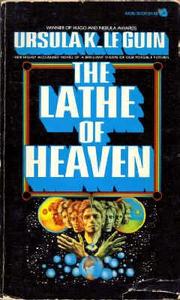dgkf apžvelgė autoriaus Ursula K. Le Guin knygą The Lathe of Heaven
A development of medical and societal ethics through the lens of a sci fi thriller
5 žvaigždutės
A slow-burn psychological thriller that ramps up to a fever pitch while hitting quite a few strong notes along the way.
The Lathe of Heaven is uniquely gripping because its themes seem to morph so fluidly throughout the novel, giving just enough breath to each to offer social commentary while still leaving plenty of air for the reader to ponder the implications. Just to name a few, the book hits on self medication, spiraling into incarceration, medical/psychological research and its ethical implications, weighing ethical responsibilities to individuals against humanity at large, our duty to monitor our unconscious biases and an amnesic fading grasp on reality. Explored in a surrealist fictional present, these topics are provided with enough distance from our real-world understanding to mull them over with fresh eyes.
Of these, I was particularly interested in the ethics of research science as these considerations still ripple through the …
A slow-burn psychological thriller that ramps up to a fever pitch while hitting quite a few strong notes along the way.
The Lathe of Heaven is uniquely gripping because its themes seem to morph so fluidly throughout the novel, giving just enough breath to each to offer social commentary while still leaving plenty of air for the reader to ponder the implications. Just to name a few, the book hits on self medication, spiraling into incarceration, medical/psychological research and its ethical implications, weighing ethical responsibilities to individuals against humanity at large, our duty to monitor our unconscious biases and an amnesic fading grasp on reality. Explored in a surrealist fictional present, these topics are provided with enough distance from our real-world understanding to mull them over with fresh eyes.
Of these, I was particularly interested in the ethics of research science as these considerations still ripple through the field of medical research today. The book offers a caricature of a fantastical medical research scenario, but its underpinning themes are still critical factors of any medical research. How patient consent is communicated, how experiments are approved, how the disadvantaged (in this case the addicted and incarcerated) may be exploited for medical gain, the professional impact of discovery, the profit motive of research and the calculus of weighing advancing knowledge that can benefit all of humanity against the sacrifices of individuals. These problems surface in our daily lives in an attenuated capacity and the book offers a hyperbolic chamber of decision making to allow us to weigh their impact.
Beyond the themes themselves, the mechanics of the story unfold in a very tangible way. The only other work of Le Guin's that I've read so far is The Left Hand of Darkness, and I found the two novels to be quite the stark contrast. Where it felt like understanding Left Hand of Darkness' world was preconditioned on an encyclopedic memory of the world's setting, The Lathe of Heaven trimmed a lot of the sci-fi fat down to only what was necessary to drive an analysis of its themes. I appreciated how direct this was, letting me devote more of my reading energy toward reflecting on the book instead of constantly retreating into the recesses of world lore to keep up. What's more, for as much as the Lathe of Heaven sticks close to many science fiction tropes, they're approached from such a unique angle that no part of the book felt like it's been overdone, even half a century after it was written.
The Lathe of Heaven was a refreshingly concise analysis of a litany of social themes, packing quite a few narrative beats into such a concise form factor. I would consider it a must read for any fans of socially critical science fiction.


